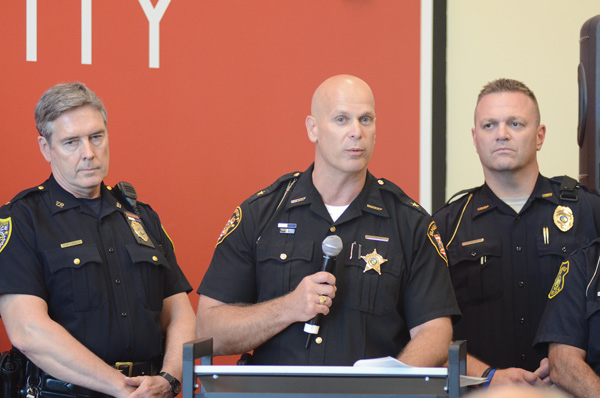

Friday, June 27, 2014

Mahoning County Sheriff Jerry Greene speaks as Canfield Police Chief Chuck Colucci looks on during Thursday night’s sales-tax hearing at the Covelli Centre.
YOUNGSTOWN
Passage of the three-quarter percent Mahoning County sales tax Nov. 4 is critical to the county’s security and economic vitality, speakers said Thursday night at the first of two public hearings on the tax.
“If we don’t provide a safe community and a safe environment for our county, we can’t grow the population, we can’t create economic development, we can’t do the things that we want to do as a county and move ourselves forward,” said county Commissioner Chairman David Ditzler.
Of the county’s $53.3 million 2013 general-fund budget, $39.1 million, or 73.43 percent, went to public safety and court functions of county government, said Audrey Tillis, county budget director.
Almost all of the county’s sales-tax revenue goes to its general fund, which is its main operating fund.
The public-safety portion includes the sheriff’s office, which operates the county jail and provides road patrols, and 911 emergency dispatching.
“Everybody wants to see safe streets,” said Walter Duzzny of Austintown, retired county emergency management director, who was the first speaker in favor of the tax during the public comment period.
“Next summer, if this is voted down, we are in big trouble,” said Linda Kovachic of Boardman, who praised the sheriff’s office for “doing a great job” of promoting public safety and having day-reporting inmates perform litter cleanup.
A partially closed county jail brought on by insufficient funding, which the county has experienced in the past, “essentially makes all of our local law-enforcement agencies ineffective” because there isn’t room to lock up all the offenders who should be jailed, said Sheriff Jerry Greene, who was flanked by city and township police chiefs as he spoke.
The commissioners are offering two sales-tax options for public comment.
Both would renew an existing half-percent sales tax for five years and add a quarter-percent sales tax of the same duration.
Either option would raise about $24 million annually.
One of the options, however, would restrict the money’s use to the sheriff’s, coroner’s, and prosecutor’s offices and the 911 emergency dispatching center. Greene urged the commissioners to put this version of the tax on the ballot.
The other option would allow unrestricted use of the money in the county’s general fund.
County, municipal, township and police officials were dominant among the speakers and in the audience of about 75 people at the hearing at the Covelli Centre.
After county officials delivered their presentations, eight people spoke in favor of the tax, and none against it.
However, George Rohr-baugh of Austintown questioned why sales-tax money goes to the 911 emergency dispatching system, which is also funded by land-line and cellphone taxes.
Tillis explained that the phone taxes pay for 911’s electronic equipment and the salary of Maggi McGee, 911 director, but the dispatchers are paid by the general fund, which the sales tax supports.
The county has another half-percent sales tax the voters made continuous in May 2007.
Each of the current half-percent sales taxes generates about $16 million a year, for a total of about $32 million.
The county’s general-fund budget this year totals $54.1 million, including nearly $2.6 million carried over from 2013 into 2014.
Tillis said the county needs the extra quarter percent, which adds about $8 million to the county sales-tax revenues, to compensate for recent losses averaging $8 million annually in income from sources including state funding, investment income and federal prisoner housing revenue.
The second sales-tax hearing will be at 6 p.m. Monday in McMahon Hall at Mill Creek MetroParks Farm in Canfield.
In their meeting immediately before the hearing, the county commissioners requested an estimate of property-tax revenue from the county auditor for a proposed 1.85-mill real-estate-tax levy on the Nov. 4 ballot that would combine and replace the county children services board’s current 1-mill and 0.85-mill levies.
Because the combination and replacement would be based on current property values, it would generate about $7.3 million annually, which is about $2.8 million more than the combined revenue from the two existing CSB levies that expire this year, said Randall Muth, CSB director.